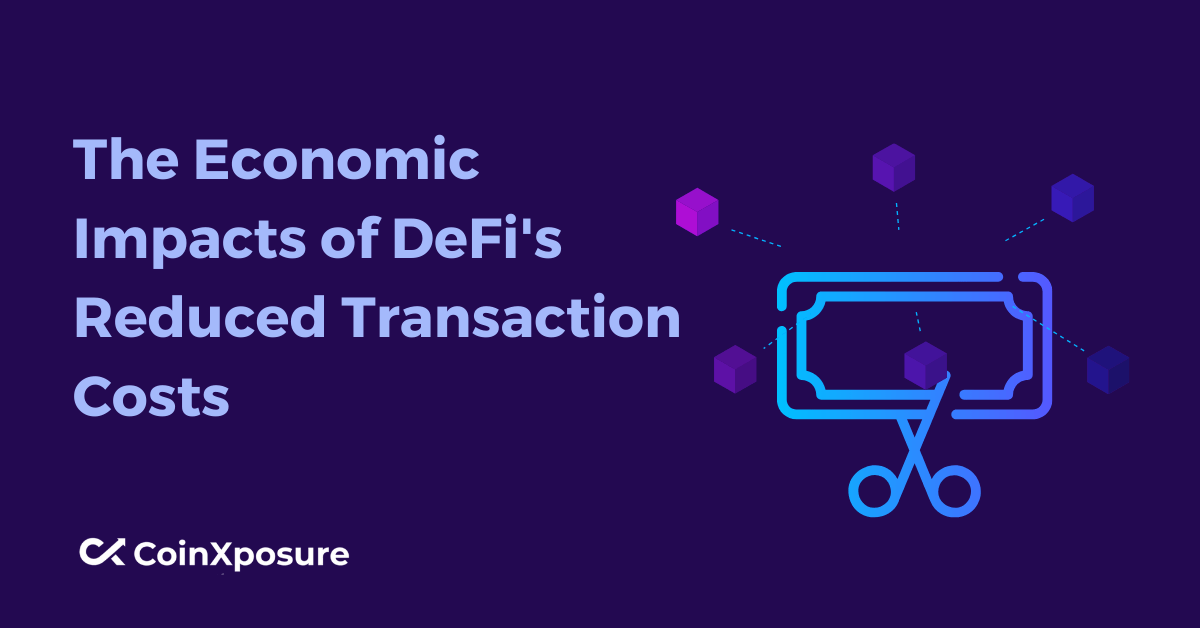Decentralized Finance (DeFi) has emerged as a disruptive force in the financial industry, offering innovative solutions that leverage blockchain technology to provide decentralized and permissionless financial services.
One of the key features of DeFi is its ability to significantly reduce transaction costs compared to traditional financial systems.
By eliminating intermediaries and leveraging automation through smart contracts, DeFi platforms have made financial transactions faster, cheaper, and more accessible to a global audience.
This article explores the economic impacts of DeFi’s reduced transaction costs, examining how they contribute to increased efficiency, financial inclusion, and market growth, while also addressing challenges and risks associated with this evolving ecosystem.
Reduced Transaction Costs
Reduced transaction costs in the realm of DeFi (Decentralized Finance) represent a fundamental shift in the financial landscape, characterized by streamlined processes and enhanced accessibility.
Unlike traditional financial systems that often involve numerous intermediaries and bureaucratic procedures, DeFi platforms leverage blockchain technology and smart contracts to minimize fees and optimize transaction speeds.
By eliminating the need for intermediaries, such as banks or payment processors, DeFi reduces overhead costs and empowers individuals to engage in financial activities with greater efficiency and lower barriers to entry.
This reduction in transaction costs not only fosters innovation and competition within the financial industry but also facilitates broader economic participation by enabling access to financial services for underserved populations worldwide.
Economic Impacts
The economic impacts of reduced transaction costs in DeFi are multifaceted and far-reaching, influencing various aspects of financial systems and global economies. Some key economic impacts include:
- Increased Efficiency
- Financial Inclusion
- Innovation and Market Growth
Increased Efficiency
Reduced transaction costs in DeFi lead to faster transaction processing and lower fees, improving overall efficiency in financial operations.
This increased efficiency translates into cost savings for users and businesses, enabling them to allocate resources more effectively and expedite economic transactions.
Financial Inclusion
By lowering barriers to entry and reducing costs associated with accessing financial services, DeFi promotes greater financial inclusion.
Individuals who were previously underserved or excluded from traditional banking systems can now participate in DeFi ecosystems, gaining access to savings, lending, and investment opportunities.
Innovation and Market Growth
The reduced transaction costs in DeFi stimulate innovation by encouraging experimentation with new financial products and services.
Entrepreneurs and developers are incentivized to create novel solutions that leverage blockchain technology, leading to the emergence of new markets and asset classes.
This innovation fosters market growth and enhances competition within the financial industry.
The economic impacts of reduced transaction costs in DeFi are transformative, reshaping traditional financial systems and democratizing access to financial services on a global scale.
However, it’s essential to address regulatory challenges and security risks to ensure the long-term sustainability and stability of DeFi ecosystems.
Challenges and Risks of Reduced Transaction Costs in DeFi
While the reduced transaction costs in DeFi offer significant benefits, they also pose several challenges and risks that need to be addressed:
- Regulatory Uncertainty
- Security Concerns
- Scalability Issues
- Lack of User Education
Regulatory Uncertainty
DeFi operates in a rapidly evolving regulatory landscape, with regulations varying significantly across jurisdictions.
The decentralized nature of DeFi platforms and the absence of central authorities make it challenging to enforce traditional financial regulations.
Regulatory uncertainty can hinder the mainstream adoption of DeFi and lead to compliance challenges for platform operators and users alike.
Security Concerns
DeFi platforms are susceptible to smart contract vulnerabilities, hacks, and exploits due to their open-source nature and reliance on blockchain technology.
Security breaches can result in significant financial losses for users and undermine trust in DeFi ecosystems. Addressing security concerns requires robust security measures, code audits, and ongoing vigilance to mitigate potential risks.
Scalability Issues
The growing popularity of DeFi has led to congestion on blockchain networks, particularly Ethereum, resulting in high gas fees and slower transaction speeds.
Scalability issues hinder the scalability and usability of DeFi platforms, limiting their capacity to support mass adoption and handle increased transaction volumes.
Scalable solutions, such as layer 2 scaling solutions and alternative blockchain platforms, are essential to address these scalability challenges effectively.
Lack of User Education
Many users may lack the necessary knowledge and understanding of DeFi protocols, smart contracts, and associated risks.
The complex nature of DeFi platforms can lead to user errors, such as sending funds to incorrect addresses or interacting with malicious smart contracts.
Enhancing user education and providing accessible resources for learning about DeFi best practices are crucial to mitigate user-related risks.
Addressing these challenges and risks is essential to ensure the long-term viability and resilience of DeFi ecosystems.
Collaboration between industry stakeholders, regulators, and cybersecurity experts is crucial to develop effective solutions and promote the responsible growth of DeFi.
Conclusion
The economic impacts of reduced transaction costs in DeFi are substantial, offering increased efficiency, financial inclusion, and innovation within the global financial landscape.
By leveraging blockchain technology and smart contracts, DeFi platforms have revolutionized traditional financial systems, empowering individuals worldwide with greater access to financial services and opportunities.
However, the journey towards realizing the full potential of DeFi is not without its challenges and risks.
Regulatory uncertainty, security concerns, scalability issues, lack of user education, and market volatility present significant obstacles that must be addressed to ensure the continued growth and stability of DeFi ecosystems.
As the DeFi industry continues to evolve and mature, collaboration between industry participants, regulators, and cybersecurity experts will be essential to navigate challenges effectively and unlock the full benefits of decentralized finance for all stakeholders.
With careful planning, innovation, and responsible governance, DeFi has the potential to reshape the financial landscape for the better, creating a more inclusive, efficient, and accessible financial ecosystem for generations to come.












